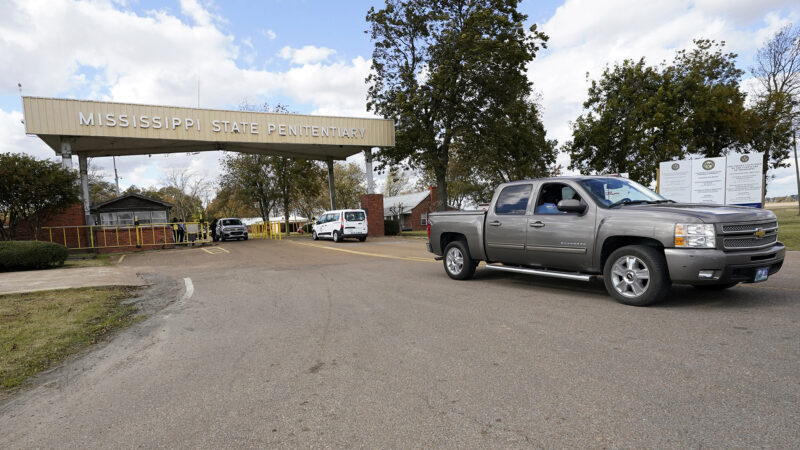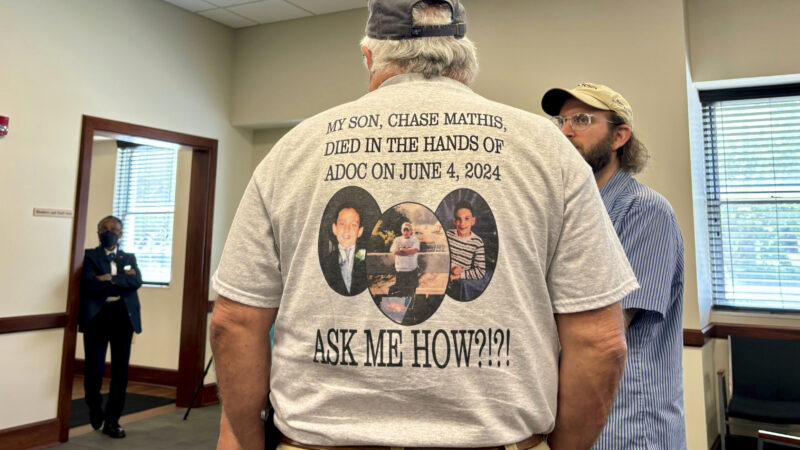Gulf South states among U.S. leaders for juvenile life without parole sentences, study shows
In this file photo, traffic leaves the front gate to the Mississippi State Penitentiary in Parchman, Miss., Nov. 17, 2021. Mississippi and Alabama are among four U.S. states that lead the nation in new juvenile life without parole sentences since 2012, according to a study from The Campaign for the Fair Sentencing of Youth.
Gulf South states dole out some of the most life without parole sentences to children, with the bulk of those sentences handed down to children of color, a new study shows.
Mississippi and Alabama are among just four states that top the nation in new juvenile life without parole sentences since 2012, according to recent data from The Campaign for the Fair Sentencing of Youth. The nonprofit focuses on juvenile incarceration.
The study shows complications in the wake of Supreme Court decisions that were supposed to limit drastically who can die in prison for something they did as a teen, as well as penalties that fall most heavily on vulnerable groups.
Standards set by the high court aren’t always being implemented correctly, said Rebecca Turner, one of the report’s co-authors.
“We’re seeing judges say that: Actually, you don’t count, because you were close to 18. Or using really traumatic events in a young person’s life to count against them,” said Turner, who also is associate legal director for the group that led the research.
The report said 28 states have banned juvenile life without parole altogether, and five more have no one serving the sentence. Louisiana, Mississippi and Alabama, however, were among a group of 10 states the report identifies as having the most people still imprisoned under juvenile life without parole sentences. Many people serving such sentences are eligible to have their cases reviewed.
In Alabama, Justice Accountability Coalition founder and co-director Lauren Faraino said she’s seeing frustrating delays in efforts to re-sentence people who received a life without parole penalty for a childhood offense.
Those proceedings, she said, often make much of minor or arbitrary things — for example, a disciplinary history that includes the use of a cell phone — and discount the way people often significantly change their lives in prison.
“I think Alabama, throughout its history and to its very core, is fixated on punishment above actual public safety, above humanity and mercy and all that we say that we believe in,” she said.
Supreme Court decisions — Graham v. Florida, Miller v. Alabama and Montgomery v. Louisiana — have chipped away at the practice of life without parole as a punishment for people who were kids at the time of their offense.
The decisions said most crimes aren’t eligible for juvenile life without parole, that judges must seriously weigh youth as a mitigating factor before giving such a sentence and that old sentences deserve a second look with new standards.
The idea, Turner explains, was that young people are “transiently immature,” and that developing brains will often age out of criminal behavior. But the decisions left open the possibility of life without parole for children who are deemed “irreparably corrupt.”
In practice, this created a standard for which states’ and courts’ interpretations have varied a lot. As a result, Turner said, many states ultimately banned juvenile life without parole sentences for being expensive, burdensome on courts and potentially ripe for bias.
“We definitely see a lot of racial disparity in how it was imposed historically and how it continues to be, imposed more frequently on Black children, specifically on Black boys,” Turner said.
Racial disparities for this sentence are worsening, with 77% of new juvenile life without parole sentences given to Black children, the data show. That’s up from 61% before 2012 — when Miller v. Alabama, one of the key Supreme Court cases, was decided.
In general, juvenile life without parole “forecloses the possibility of redemption,” Faraino said.“I like to believe we’re in a world where people can change, and grow, and show that they can live safely amongst society.”
A Philadelphia study of people who had been sentenced to juvenile life without parole and were later released found a low recidivism rate, with 96% having no known contact with law enforcement during the period researchers examined.
That review estimated $9.5 million in savings for the state of Pennsylvania based on those individuals’ releases.
This story was produced by the Gulf States Newsroom, a collaboration between Mississippi Public Broadcasting, WBHM in Alabama, WWNO and WRKF in Louisiana and NPR.
Alabama prison chief responds to families’ criticism
The department said that a number of changes have been made since Corrections Commissioner John Q. Hamm was appointed in 2022. The department said hiring has increased, and there are ongoing efforts to curb the flow of contraband and improve communications with families.
40 years after ‘Purple Rain,’ Prince’s band remembers how the movie came together
Before social media, the film Purple Rain gave audiences a peak into Prince’s musical life. Band members say the true genesis of the title song was much less combative than the version presented in the film.
Park Fire in California could continue growing exponentially, Cal Fire officer says
Cal Fire has confirmed that over a hundred structures have been damaged in the Park Fire, which grew overnight near Chico, Calif. Difficult firefighting conditions are forecast through Friday night.
Checking in with Black voters in Georgia about the election, now that Biden is out
Some voters who could be key to deciding who wins Georgia. What do they think about Vice President Harris becoming the frontrunner in the race to be the Democratic nominee?
Tahiti’s waves are a matter of ‘life and death’ for surfing Olympics
Tahiti's Teahupo'o wave has a slew of riders for the Paris 2024 Olympics. NPR finds out why it's called one of the most dangerous waves.
Researchers are revising botanical names to address troubling connotations
Since the mid-1700s, researchers have classified life with scientific names. But some of them have problematic histories and connotations. The botanical community is trying to tackle this issue.




